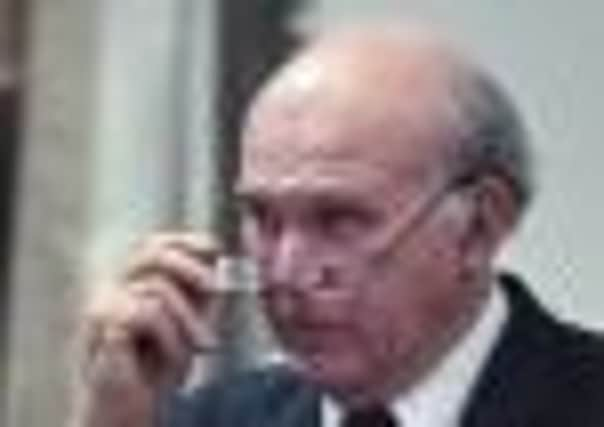Doubts over Cable’s equity market review


Margaret Wood, chairman of the Institute of Directors (IoD) in Yorkshire and shareholders’ champion Roger Lawson yesterday questioned whether the review will change the “quick-buck” attitude at the heart of UK plc.
They were speaking after Dr Cable, the Business Secretary, asked Professor John Kay to recommend ways of strengthening the involvement of shareholders. It was prompted by concerns over the influence of hedge funds and traders on the way some listed companies are run.
Advertisement
Hide AdAdvertisement
Hide AdMrs Wood, who founded her specialist engineering and manufacturing firm ICW Modular Glazing in 1991, cast doubt over whether the exercise will provide clarity for businesses.
“There is no doubt that many investors could do more to engage with their companies under ownership.
“However, these are issues which have already been considered in a number of Government reviews of corporate governance over the last couple of years, including the recent Department for Business, Innovation & Skills consultation on short-termism.
“It is not clear what a further review of these issues will uncover. What is needed right now is a period of stability in corporate policy making, not further uncertainty.”
Advertisement
Hide AdAdvertisement
Hide AdThe review comes after a series of shareholder revolts over the level of pay at major financial institutions.
The board of Skipton Building Society came under fire from members in April over “irresponsible” pay packages and the £260,000 pay-off awarded to a finance director who left after only a year.
A few days later Pensions & Investments Research Consultants, the influential investor body, spoke out against Barclays’ remuneration report which could see chief executive Bob Diamond awarded up to £27m.
Last night Roger Lawson, chairman of the newly formed ShareSoc – the UK Individual Shareholders Society – told the Yorkshire Post they would be making submissions to Prof Kay.
Advertisement
Hide AdAdvertisement
Hide Ad“Companies are not under the control of the people who own them, like shareholders.
“We think there should be substantial changes to the stock market and regulation of companies.
“If you look at the banks and the things that have been done since the financial crisis they have been trivial. The Turner review (on how to reform the excesses of the City of London) was a bit of a damp squib.”
ShareSoc wants to see company directors appointed by independent committees, rather than by current board members, which would lead to greater checks and balances on boards.
Advertisement
Hide AdAdvertisement
Hide AdMr Lawson said the previous Government has been “very reluctant” to change the banks as it proved its business-friendly credentials.
“Labour cow-towed to the financial services sector and there was never likely to be a substantial change. This is why pay has got out of control.
“There has been a strong reluctance by the Government to do anything about the way the stock market operates.”
Last week Dr Cable, the York-born Liberal Democrat, said equity investment needed to be “recalibrated” to support the long-term interest of companies and underlying beneficiaries, such as pension fund members.
Advertisement
Hide AdAdvertisement
Hide AdHe commissioned the review after a series of Whitehall-driven studies on what can be learned from the financial crisis.
It follows an examination of corporate governance, which he also launched, in response to the controversial takeover of Cadbury by US rival Kraft Foods.
The Kay review will report preliminary findings at the end of this year, and produce a final report in 2012.
It will examine “how best to ensure that the timescales over which companies and fund managers operate match the interest of clients and beneficiaries”.
Advertisement
Hide AdAdvertisement
Hide AdDr Cable said: “The growing demand for early returns has serious implications for investment in longer-term projects, such as improvements to infrastructure networks or the development of new technologies, which by their very nature only produce a return over a period of many years.
“Such projects may not fit with the quick-buck mentality that appears to be gaining in popularity, but they are essential in facilitating the UK’s long-term growth.”
‘No need to raise interest rates’
The Bank of England has no reason to raise interest rates, as credit and wage growth are slow and there is little risk of a repeat of 1970s-style stagflation, policymaker Adam Posen said yesterday.
Dr Posen, the most dovish member of the Bank’s rate-setting committee, also said public inflation expectations remained stable. Oil prices and productivity growth – two other past triggers of stagnant growth twinned with high inflation – were not yet a cause for concern either.
Advertisement
Hide AdAdvertisement
Hide AdHe dismissed a call, from the Basel-based Bank for International Settlements, for UK rates to be raised above 0.5 per cent.
“BIS just said all central banks should raise rates, and pointed to the UK’s above-target past inflation. Nonsense,” he wrote in slides provided by the Bank of England, to accompany a closed-door presentation at the University of Aberdeen.